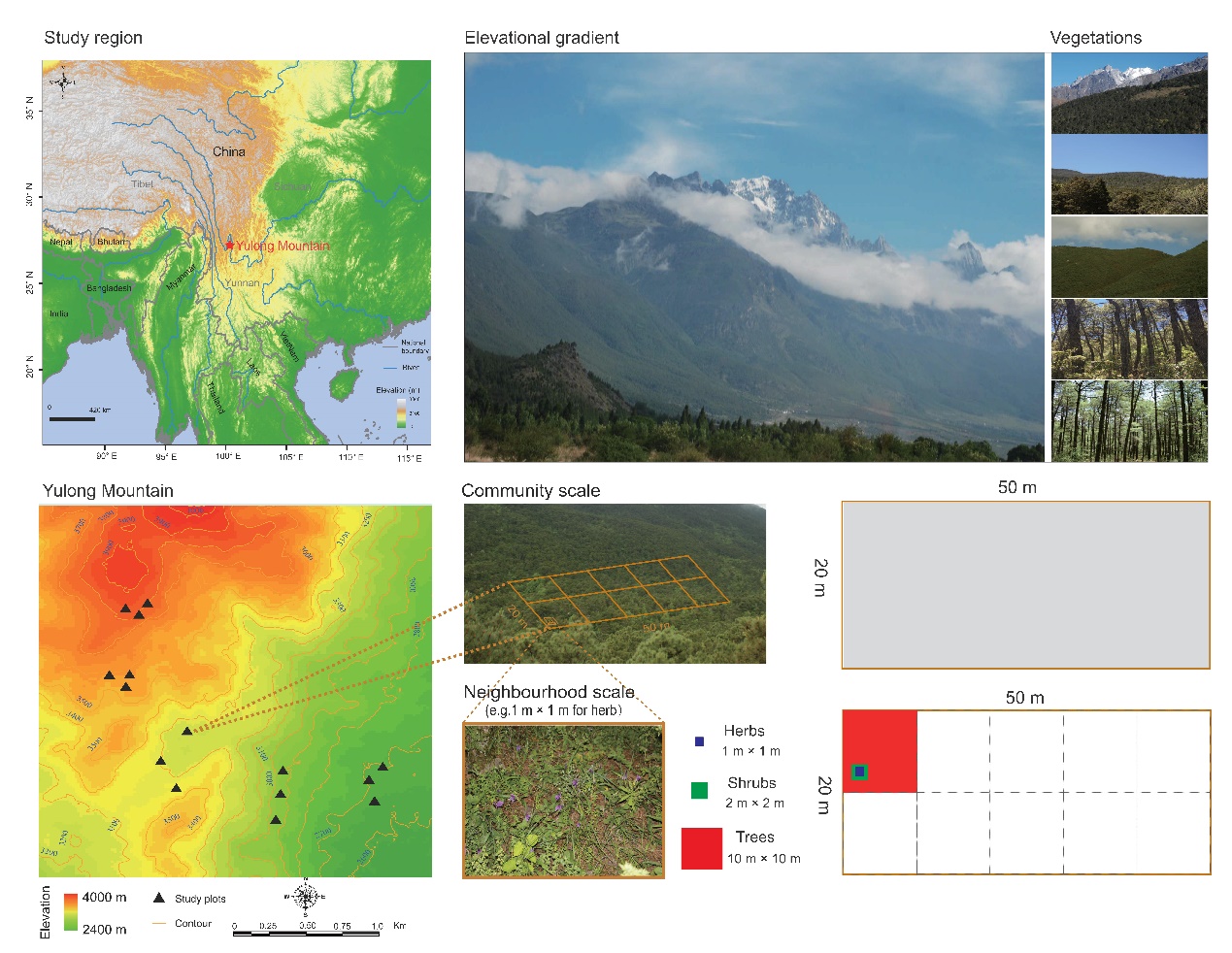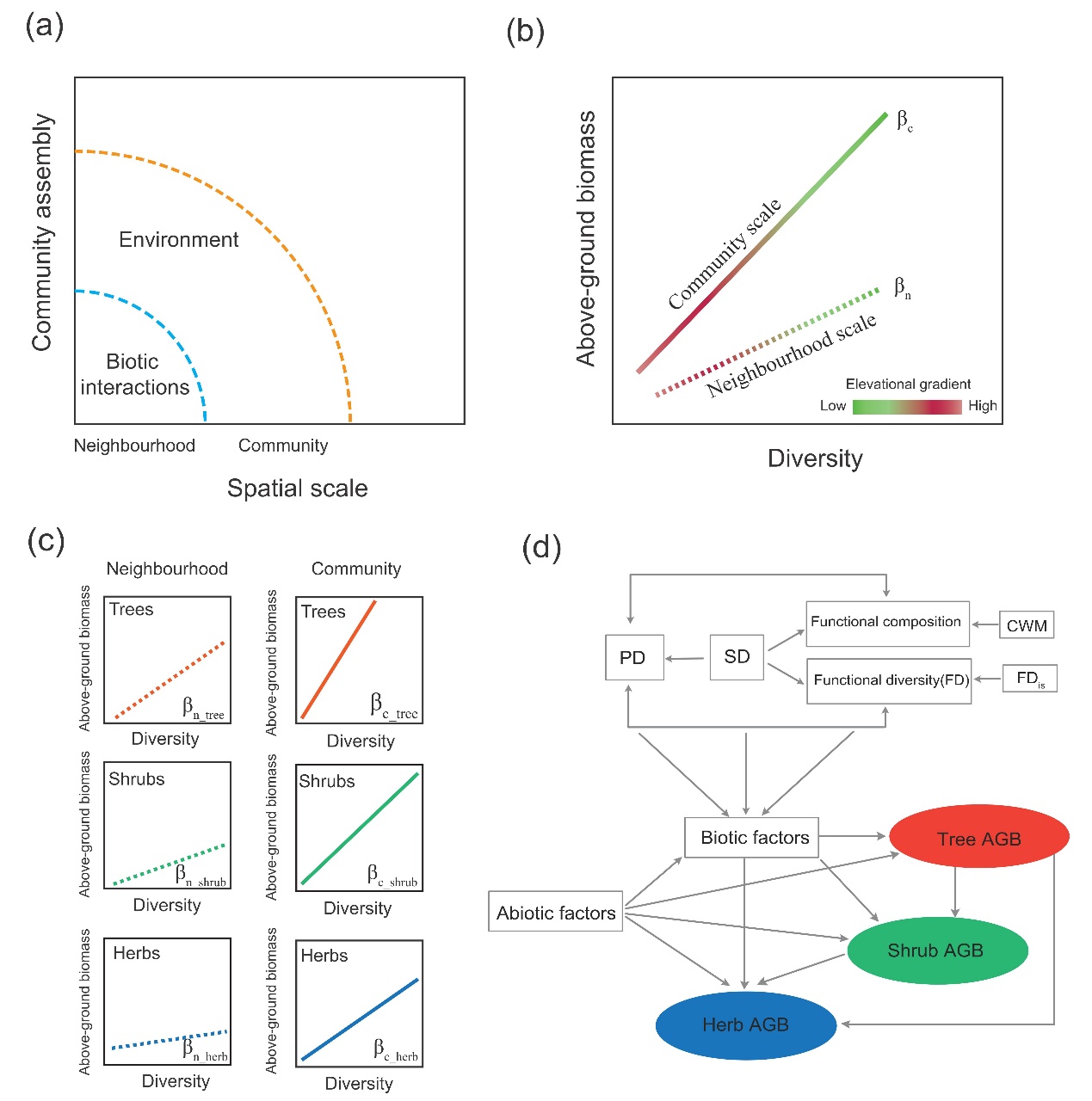There are increasing concerns that global biodiversity loss and species composition changes under the global change (i.e., climatic change, land use change, human disturbance etc.) will have a direct negative impact on ecosystem functioning. However, the mechanisms underpinning the biodiversity-ecosystem function relationships remain unresolved.
In heterogeneous forest, plants occupy several distinct forest strata (e.g., canopy trees, woody understory and the herbaceous ground layer), which are subject to differing assembly mechanisms.
In forest ecosystems, a substantial portion of the carbon is stored in above-ground biomass. Thus, the relationships between diversity and above-ground biomass could be influenced by the forest strata and the investigated scales. However, little is known about how the scale and strata-dependent processes influence the relationships between diversity and ecosystem function so far.
Research groups, led by Professor LI Dezhu and GAO Lianming from Kunming Institute of Botany, Chinese Academy of Sciences (KIB/CAS), together with Prof. Marc Cadotte from University of Toronto and Prof. Kevin Burgess from Columbus State University established a forest transect along elevational gradient in Yulong Mountain in 2013. The region is core area of the Hengduan Mountains with dramatical changes of topography and climate that located in the global biodiversity hotspots ‘Mountains of Southwest China’.
Based on the transect, the team aim to detangle how the multi-dimension diversity influence the ecosystem function in natural forests and make long-term monitoring biodiversity dynamics.
In this study, the research team integrated the species composition, phylogenies and functional traits to evaluate the effects of elevational diversity on above-ground biomass across forest strata and spatial scales.
The team found that community-weighted means of height and leaf phosphorous concentration and functional diversity in specific leaf area exhibited positive correlations with tree biomass, suggesting that both positive selection effects and complementarity occur. However, high shrub biomass is associated with greater dissimilarity in seed mass and multidimensional trait space, while species richness or phylogenetic diversity is the most important predictor for herbaceous biomass, indicating that species complementarity is especially important for understory function. The strength of diversity-biomass relationships increases at larger spatial scales.
The research concludes that strata- and scale- dependent assessments of community structure and function are needed to fully understand how biodiversity influences ecosystem function.
This research suggests that understory species (e.g., shrubs, herbs) are a unique system in elucidating the pattern and mechanism of the relationships between biodiversity and functioning in forest ecosystems. Insightfully, it is also expected that the diversity effect on ecosystem function depends on the spatial scale considered, with higher probability of positive effect of diversity on ecosystem functioning to be observed in more heterogeneous landscapes.
The paper was recently published online entitled "Greater than the sum of the parts: how the species composition in different forest strata influence ecosystem function" in Ecology Letters.
This study was supported by the Strategic Priority Research Program of Chinese Academy of Sciences (XDB31010000), the National Natural Science Foundation of China (31800354), the China Postdoctoral Science Foundation (2017M623082), the Program of Science and Technology Talents Training of Yunnan Province, China (2017HA014) and the Postdoctoral targeted funding from Yunnan Province.

Figure 1 Location of study region and sampling plots along an elevational gradient on Yulong Mountain within the Hengduan Mountains, Southwest of China. (Image by KIB)

Figure 2 The hypothetical scheme describing the effects of strata- and spatial-dependent community assembly on above-ground biomass (AGB) along elevational gradients.(Image by KIB)
Contact:
YANG Mei
General Office
Kunming Institute of Botany, CAS
Email: yangmei@mail.kib.ac.cn
(Editor: YANG Mei)




